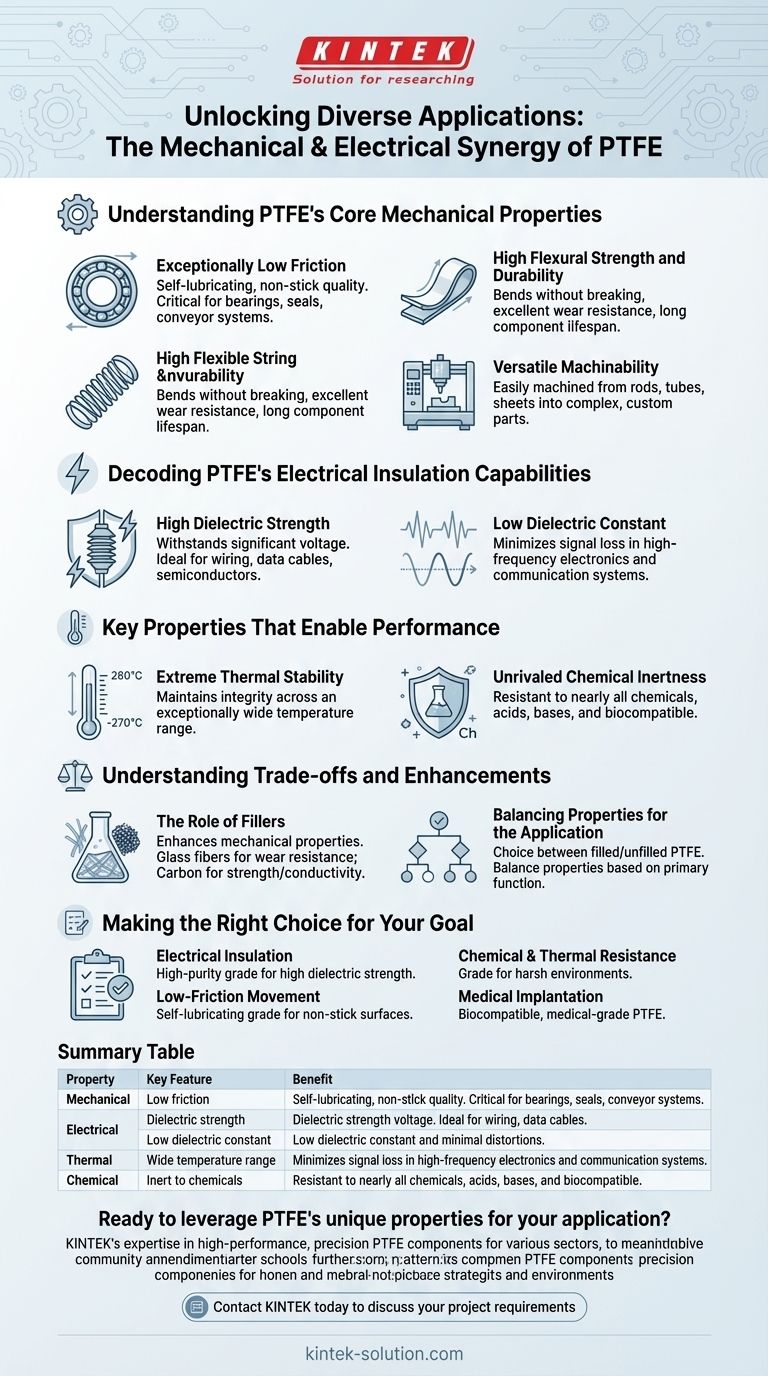At its core, Polytetrafluoroethylene (PTFE) is uniquely suited for diverse applications because it combines exceptional electrical insulation with superior mechanical slipperiness. Its key mechanical properties are an extremely low coefficient of friction and high flexural strength, while its defining electrical properties are high dielectric strength and a low dielectric constant. This rare combination is further enhanced by its extreme thermal and chemical stability.
The true value of PTFE is not found in a single feature, but in its powerful synergy of properties. It solves engineering challenges by simultaneously resisting electricity, friction, chemicals, and extreme temperatures in a way few other materials can.

Understanding PTFE's Core Mechanical Properties
The mechanical behavior of PTFE makes it a premier material for components that must move smoothly and withstand stress, especially in challenging conditions.
Exceptionally Low Friction
PTFE has one of the lowest coefficients of friction of any known solid. This gives it a "self-lubricating" or non-stick quality.
This property is critical for applications like bearings, seals, and conveyor systems, where reducing resistance and wear is paramount.
High Flexural Strength and Durability
The material exhibits high flexural strength, meaning it can bend without breaking, even at very low temperatures.
This resilience ensures reliability in dynamic systems and provides excellent wear resistance, contributing to a longer component lifespan.
Versatile Machinability
PTFE is easily machined from standard forms like rods, tubes, and sheets.
This adaptability allows for the creation of complex and custom-designed parts, making it suitable for a wide array of specialized applications.
Decoding PTFE's Electrical Insulation Capabilities
PTFE's electrical properties make it a first-choice material for insulating critical electrical and electronic components, ensuring both safety and signal integrity.
High Dielectric Strength
Dielectric strength is a measure of a material's ability to act as an electrical insulator. PTFE has a very high dielectric strength, allowing it to withstand significant voltage before breaking down.
This makes it an ideal insulator for wiring, data cables, and components in semiconductor manufacturing.
Low Dielectric Constant
A low dielectric constant is crucial for high-frequency applications, as it minimizes signal loss and distortion.
PTFE’s excellent dielectric properties ensure reliable performance in advanced electronics and communication systems where signal clarity is essential.
Key Properties That Enable Performance
The mechanical and electrical advantages of PTFE are only viable because they are supported by its profound resistance to environmental factors.
Extreme Thermal Stability
PTFE maintains its integrity and performance across an exceptionally wide temperature range, typically from -270°C to 260°C.
This stability allows it to function reliably in applications involving severe heat or cryogenic cold, from aerospace components to industrial pipework.
Unrivaled Chemical Inertness
The material is resistant to nearly all chemicals, acids, and bases. It is also inert to bodily fluids.
This chemical resistance is why PTFE is widely used for containers, pipe linings in chemical plants, and biocompatible medical implants.
Understanding the Trade-offs and Enhancements
While pure PTFE offers a remarkable baseline of properties, its performance can be tailored and its limitations addressed for specific high-demand applications.
The Role of Fillers
Pure PTFE can be relatively soft. Its mechanical properties, such as wear resistance, can be significantly enhanced by adding fillers.
For example, glass fibers are added to increase wear resistance, while carbon can be used to improve thermal conductivity and strength.
Balancing Properties for the Application
The choice to use a filled or unfilled PTFE is a critical design decision.
Adding fillers to boost one property, like stiffness, may slightly alter another, such as its coefficient of friction or chemical compatibility. This balance must be carefully considered based on the primary function of the component.
Making the Right Choice for Your Goal
To select the right grade of PTFE, you must identify the most critical demand of your application.
- If your primary focus is electrical insulation: You need a high-purity grade of PTFE to leverage its high dielectric strength and low dielectric constant for cables or semiconductors.
- If your primary focus is low-friction movement: A self-lubricating grade is ideal for bearings, seals, or non-stick surfaces where minimizing wear is the goal.
- If your primary focus is chemical and thermal resistance: You should choose a grade designed for stability in harsh environments, such as linings for pipes and vessels.
- If your primary focus is medical implantation: You must use a biocompatible, medical-grade PTFE that guarantees inertness and purity within the human body.
Ultimately, PTFE’s versatility comes from its ability to solve multiple engineering problems at once, making it an indispensable material in modern technology.
Summary Table:
| Property | Key Feature | Benefit |
|---|---|---|
| Mechanical | Extremely low coefficient of friction | Self-lubricating, reduces wear |
| Mechanical | High flexural strength | Durable, bends without breaking |
| Electrical | High dielectric strength | Superior electrical insulation |
| Electrical | Low dielectric constant | Minimal signal loss in high-frequency applications |
| Thermal | Wide temperature range (-270°C to 260°C) | Stable in extreme heat or cold |
| Chemical | Inert to most chemicals and acids | Resists corrosion, ideal for harsh environments |
Ready to leverage PTFE's unique properties for your application?
KINTEK specializes in manufacturing high-performance, precision PTFE components—including seals, liners, and custom labware—for the semiconductor, medical, laboratory, and industrial sectors. Whether you need a standard part or a custom-fabricated solution from prototype to high-volume production, our expertise ensures you get a component that perfectly balances mechanical, electrical, thermal, and chemical properties for your specific needs.
Contact KINTEK today to discuss your project requirements and discover how our PTFE solutions can enhance your product's performance and reliability.
Visual Guide

Related Products
- Custom PTFE Parts Manufacturer for Teflon Parts and PTFE Tweezers
- Custom PTFE Parts Manufacturer for Teflon Containers and Components
- Custom PTFE Teflon Balls for Advanced Industrial Applications
- Custom PTFE Square Trays for Industrial and Laboratory Use
- Custom PTFE Sleeves and Hollow Rods for Advanced Applications
People Also Ask
- What are the key considerations when machining Teflon? Master Precision Machining for Soft Polymers
- What industries use PTFE machined parts and for what applications? Critical Components for Demanding Environments
- Why is PTFE rod suitable for automotive applications? Boost Vehicle Performance & Durability
- How does PTFE contribute to low friction and wear resistance? Achieve Superior Performance with Advanced Materials
- What are the future considerations for machining Teflon? Mastering Material Challenges with Smart Tech



















